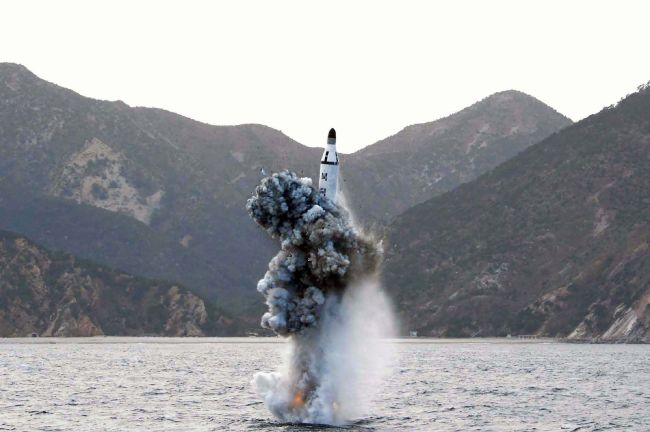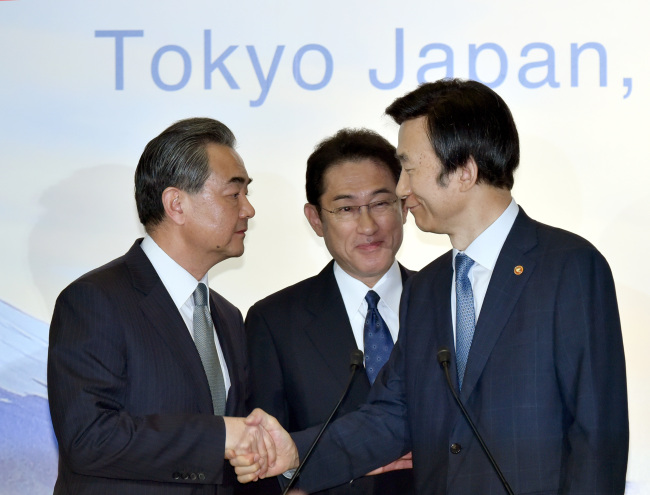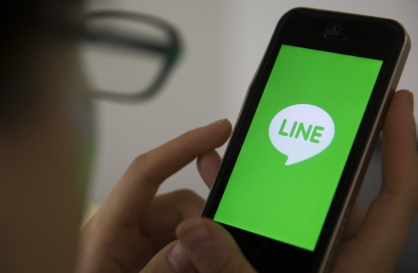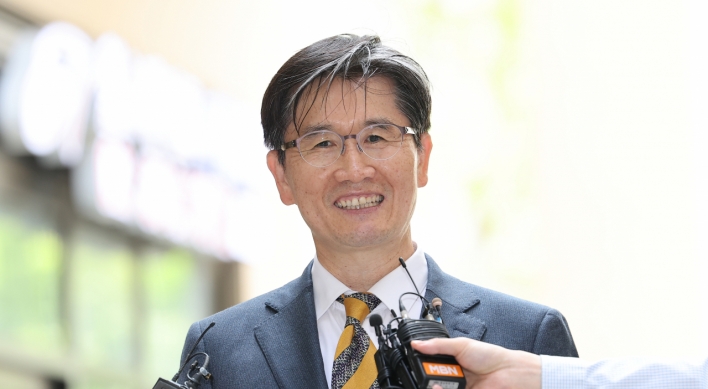North Korea succeeds in submarine-launched ballistic missile test
S. Korea, China, Japan vow actions against N.K. missiles
By Korea HeraldPublished : Aug. 24, 2016 - 17:01
In the wake of North Korea‘s successful test-fire of a submarine-launched ballistic missile on Wednesday, South Korea and its neighboring states vowed counteraction against the communist regime’s nuclear armament.
South Korean President Park Geun-hye, during a visit to a battalion in the central forward area, called for strengthened national defense, stressing that the North’s threats have become tangible.
In Tokyo, the top diplomats of South Korea, China and Japan jointly denounced the North‘s missile launch and vowed joint efforts against its persisting nuclear armament during their trilateral meeting.
The North’s latest provocation came on the second day of the Ulchi Freedom Guardian, a Korea-US joint military exercise, to which North Korea has strongly protested and vowed retaliatory action.
At around 5:30 a.m., North Korea test-fired a submarine-launched ballistic missile from the vicinity of the eastern port city of Sinpo, according to the Joint Chiefs of Staff.
South Korean President Park Geun-hye, during a visit to a battalion in the central forward area, called for strengthened national defense, stressing that the North’s threats have become tangible.
In Tokyo, the top diplomats of South Korea, China and Japan jointly denounced the North‘s missile launch and vowed joint efforts against its persisting nuclear armament during their trilateral meeting.
The North’s latest provocation came on the second day of the Ulchi Freedom Guardian, a Korea-US joint military exercise, to which North Korea has strongly protested and vowed retaliatory action.
At around 5:30 a.m., North Korea test-fired a submarine-launched ballistic missile from the vicinity of the eastern port city of Sinpo, according to the Joint Chiefs of Staff.

The missile, which flew some 500 kilometers before falling into the sea within Japan’s air defense identification zone, was considered successful, unlike two previous attempts of the kind.
”Considering that North Korea is under the dictatorship and that its leader Kim Jong-un has an unpredictable temper, these (nuclear) threats are highly likely to take shape,“ President Park was quoted as saying as she examined the military readiness posture during the UFG and to encourage soldiers.
”Also, amid its isolation and economic difficulties, which has recently led to the defection of high-ranking officials, it is plausible that (the North Korean regime) may make (preemptive) provocations so as to stop internal division.“
The North’s SLBM, along with the nuclear-capable bomber and intercontinental ballistic missile, is seen as completing what experts refer to as the nuclear triad, thus posing a tangible threat to South Korea and its ally the United States.
”Considering that North Korea is under the dictatorship and that its leader Kim Jong-un has an unpredictable temper, these (nuclear) threats are highly likely to take shape,“ President Park was quoted as saying as she examined the military readiness posture during the UFG and to encourage soldiers.
”Also, amid its isolation and economic difficulties, which has recently led to the defection of high-ranking officials, it is plausible that (the North Korean regime) may make (preemptive) provocations so as to stop internal division.“
The North’s SLBM, along with the nuclear-capable bomber and intercontinental ballistic missile, is seen as completing what experts refer to as the nuclear triad, thus posing a tangible threat to South Korea and its ally the United States.

Top envoys of Seoul, Beijing and Tokyo agreed to call for an international response, including resolution on the United Nations Security Council level, against the North’s provocations. They also defined the North’s latest missile test as a “provocation that cannot be tolerated.”
“I highly appreciate Japan and China’s efforts to implement the UN Security Council Resolution 2270 (to curb North Korea‘s nuclear activities),” South Korea’s Foreign Minister Yun Byung-se told his Japanese and Chinese counterparts Fumio Kishida and Wang Yi during the meeting.
“Today we, ministers, have reconfirmed our shared cognition on zero-tolerance for the North‘s nuclear armament.”
The minister also underlined that the North’s fast progress in nuclear and ballistic missile technology poses significant threats upon the security of the Northeast Asian region, calling for trilateral unity.
China and Japan continue to remain at odds over the Senkaku or Diaoyu islands in the East China Sea, while South Korea and China have recently faced tense relations over a decision to deploy an anti-missile battery.
The JCS also released a statement earlier in the day and called the latest launch a serious challenge to the peninsula’s security and a violation of the UN Security Council resolution.
“Based on solid defense alliance, we shall respond sternly to any provocations by the North.”
Upon the detection of the launch, the presidential office held an emergency standing committee session of the National Security Council.
The meeting, chaired by Kim Kwan-jin, chief of the presidential National Security Office, kicked off at 7:30 a.m., just hours after the communist neighbor shot the missile earlier in the day, according to Cheong Wa Dae spokesperson Jung Youn-kuk.
The participants were presidential chief of staff Lee Won-jong, Foreign Minister Yun Byung-se, Defense Minister Han Min-koo, Unification Minister Hong Yong-pyo, National Intelligence Service Director Lee Byung-ho, deputy national security advisor and NSC Secretary-General Cho Tae-yong and senior presidential secretary for foreign affairs Kim Kyou-hyun.
By Bae Hyun-jung(tellme@heraldcorp.com)
“I highly appreciate Japan and China’s efforts to implement the UN Security Council Resolution 2270 (to curb North Korea‘s nuclear activities),” South Korea’s Foreign Minister Yun Byung-se told his Japanese and Chinese counterparts Fumio Kishida and Wang Yi during the meeting.
“Today we, ministers, have reconfirmed our shared cognition on zero-tolerance for the North‘s nuclear armament.”
The minister also underlined that the North’s fast progress in nuclear and ballistic missile technology poses significant threats upon the security of the Northeast Asian region, calling for trilateral unity.
China and Japan continue to remain at odds over the Senkaku or Diaoyu islands in the East China Sea, while South Korea and China have recently faced tense relations over a decision to deploy an anti-missile battery.
The JCS also released a statement earlier in the day and called the latest launch a serious challenge to the peninsula’s security and a violation of the UN Security Council resolution.
“Based on solid defense alliance, we shall respond sternly to any provocations by the North.”
Upon the detection of the launch, the presidential office held an emergency standing committee session of the National Security Council.
The meeting, chaired by Kim Kwan-jin, chief of the presidential National Security Office, kicked off at 7:30 a.m., just hours after the communist neighbor shot the missile earlier in the day, according to Cheong Wa Dae spokesperson Jung Youn-kuk.
The participants were presidential chief of staff Lee Won-jong, Foreign Minister Yun Byung-se, Defense Minister Han Min-koo, Unification Minister Hong Yong-pyo, National Intelligence Service Director Lee Byung-ho, deputy national security advisor and NSC Secretary-General Cho Tae-yong and senior presidential secretary for foreign affairs Kim Kyou-hyun.
By Bae Hyun-jung(tellme@heraldcorp.com)
-
Articles by Korea Herald









![[Weekender] How DDP emerged as an icon of Seoul](http://res.heraldm.com/phpwas/restmb_idxmake.php?idx=644&simg=/content/image/2024/04/25/20240425050915_0.jpg&u=)

![[Today’s K-pop] NewJeans' single teasers release amid intrigue](http://res.heraldm.com/phpwas/restmb_idxmake.php?idx=644&simg=/content/image/2024/04/26/20240426050575_0.jpg&u=)






![[Herald Interview] Mistakes turn into blessings in street performance, director says](http://res.heraldm.com/phpwas/restmb_idxmake.php?idx=652&simg=/content/image/2024/04/28/20240428050150_0.jpg&u=)
